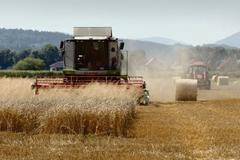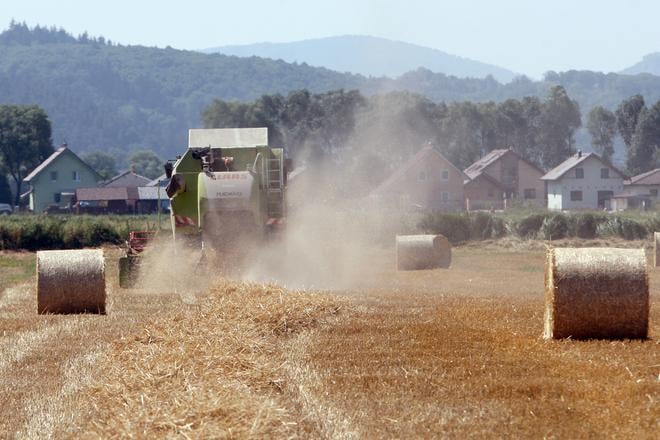The European Commission has formally requested Slovakia, along with other post-communist countries, to amend laws on the acquisition of agricultural land so as to not violate EU rules guaranteeing free movement of capital and freedom of establishment. If Slovakia does not comply, the EC may send the case to the European Court of Justice.
While Agriculture Minister Gabriela Matečná admits some changes are possible after coming to an agreement with coalition partners, former agriculture minister Ľubomír Jahnátek, during whose term Slovak parliament passed the problematic law, rejects any changes.
“Certainly some changes should have to be made to the given law and, of course, as it is a problem of the Slovak Republic, I will negotiate this with all coalition partners,” said Matečná, nominee of the Slovak National Party (SNS) as cited by the TASR newswire on May 27, adding that the legal section of the ministry is already working on the matter.
For now, Matečná is not able to say whether the Slovak law should make Slovak citizens and foreigners equal when purchasing agricultural land.
“I cannot answer this yet,” said Matečná. “It is premature to speak about it as because we are now preparing a proposal which we will submit to individual coalition partners and the cabinet should discuss it too.”
The EC formally requested Bulgaria, Hungary, Latvia, Lithuania and Slovakia to amend legislation on the acquisition of agricultural land on the grounds that it violates the free movement of capital and freedom of establishment when it sent a so-called reasoned opinion on May 26. Countries have two months to respond.
“While the EC agrees that national authorities should be able to properly regulate farm land markets, it found a number of these measures excessively restrictive and discriminatory in terms of attracting investment in rural development,” said Andrej Králik of the Representation of the European Commission (EC) in Slovakia.
The Treaty of Accession 2003 provided new member states with a transitional period in which to bring their national rules on the acquisition of agricultural land into line with EU law. Following the expiration of these periods in 2014, Bulgaria, Hungary, Latvia, Lithuania and Slovakia adopted new laws regulating the acquisition of agricultural land. These new national rules contain several provisions which the EC considers to be a restriction to the free movement of capital and freedom of establishment.
“This may in turn discourage cross-border investment,” EC writes in the press release. “Some of the restrictions may be pursuing justifiable objectives as they aim to combat speculative purchases, or serve planning purposes and rural policy objectives; however, in order to be lawful, they must be proportionate and cannot be discriminatory towards other EU citizens.”
Slovak legislation
Slovakia put a moratorium on selling agricultural land to foreign nationals upon its entry into the EU on May 1, 2004. In 2011, the EU approved Slovakia’s request to extend the moratorium by three years, with an expiration date of April 30, 2014. After the moratorium lapsed, Slovakia adopted a law regulating trade with land when people are entitled to acquire agricultural land if they have been active in agriculture production for at least three years and must have a residence permit in Slovakia valid for at least 10 years.

The new legislation prepared under the auspices of the Agriculture Ministry, led by Jahnátek, was meant to stop speculative purchases of land and improve the protection of land funds in Slovakia.
The legislation pertains to plots larger than 2,000 square metres laying outside a territory of a municipality. Based on the law a land owner can sell his or her land to a foreigner only when he or she fails to find a purchaser in Slovakia, the Sme daily wrote. The aim of the law was to keep agricultural land in Slovak hands.

Matečná points out foreign business entities can obtain land in other ways, for example, via the acquisition of a Slovak company.
The Slovak Agriculture and Food Chamber (SPPK) insists on strict wording of the law, “to prevent cases when some subjects acquire land purposefully to take subsidies,” SPPK spokewsoman Jana Holéciová told the public broadcaster RTVS.
SPPK estimates that foreign business entities own about 10 percent of Slovak land; especially Danes, Dutch, Austrians and Italians are interested in Slovak land. Allegedly, foreigners have already acquired 40 percent of agricultural land in the Malacky district in western Slovakia, according to RTVS.
Jahnátek insists Slovakia should keep the law unchanged even at the risk of entering a dispute with the European Union. He argues that Slovakia does not receive the same agricultural subsidies as other EU member countries and thus it should not liberalise its land market. Moreover, according to him, the EC is using a different measurement for Slovakia.
“There is [in the law] nothing different than what is today commonly valid in other European countries, for example France, Sweden, Italy or Austria,” Jahnátek told the TA3 news channel.



 (source: Sme)
(source: Sme)